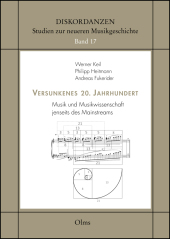 Neuerscheinungen 2016Stand: 2020-02-01 |
Schnellsuche
ISBN/Stichwort/Autor
|
Herderstraße 10
10625 Berlin
Tel.: 030 315 714 16
Fax 030 315 714 14
info@buchspektrum.de |

Andreas Fukerider, Philipp Heitmann, Werner Keil
(Beteiligte)
Versunkenes 20. Jahrhundert
Musik und Musikwissenschaft jenseits des Mainstreams
2016. 253 S. 240 mm
Verlag/Jahr: OLMS 2016
ISBN: 3-487-15448-X (348715448X)
Neue ISBN: 978-3-487-15448-0 (9783487154480)
Preis und Lieferzeit: Bitte klicken
Das 20. Jahrhundert zeigt eine unerhörte Fülle und Diversität an Diskursen, die das Musikdenken irreversibel prägen: Naturwissenschaftsboom, Revision der Weltbilder, Szientismus, Technik und Computer setzen Maßstäbe und liefern neue Referenzfelder. Die Musik gerät unter wachsenden Abstraktions- und Legitimationsdruck, dem sie durch Allianzen mit Zahlenwelten, Natur- und Superwissenschaften oder synkretistische Transsysteme begegnet. Diese Entwicklungen werden anhand zweier Hauptwerke der Avantgardisten György Ligeti und Conlon Nancarrow von je komplexer Zahlenbasierung und frappierender Logik reflektiert.
Auch der Musiktheorie bieten sich umstrittene Allianzen: die mengentheoretisch basierte Pitch Class Set Theory Allen Fortes, deren kritische Wissenschaftsrezeption hier näher erforscht wird. Als parawissenschaftlicher Kontrapunkt steht zu Beginn Cyril Scott, erfolgreicher Komponist, Pianist und Theosoph, dessen hermetischer Symbolismus die Diskontinuitäten des 20. Jahrhunderts unterläuft und ein Bild evoziert, wonach das Antimoderne Teil der Moderne ist.
Kontroversität und Distanz zum Mainstream sind allen gemeinsam: Von hier öffnet sich der Blick auf versunkene ästhetische Pfade.
The 20th century demonstrates an unheard-of wealth and diversity of discourses which have irreversibly influenced musical thought: the boom in the sciences, the revision of world-views, scientism, technology and computers set new benchmarks and offer new fields of reference. Music comes under increasing pressure for abstraction and legitimisation, which it confronts using alliances with the world of numbers, natural sciences and supersciences or syncretic cross-systems. These developments are reflected in two major works by the avant-garde composers György Ligeti and Conlon Nancarrow, each based on a complex number system and striking logic.
Music theory also offers contested alliances: the critical academic reception of Allen Forte´s set-theory based class set theory is examined in detail here. As a parascientific counterpoint, Cyril Scott appears at the start, a successful composer, pianist and theosophist, whose hermetic symbolism avoids the discontinuities of the 20th century and evokes an image of the anti-modern as part of the modern.
Controversy and distance from the mainstream are common to all, opening the view towards sunken aesthetic paths.


